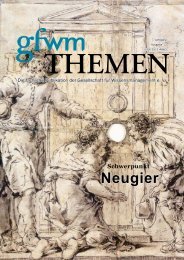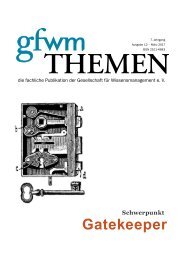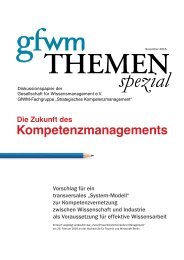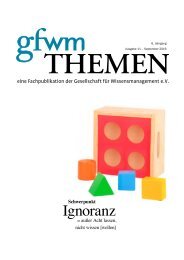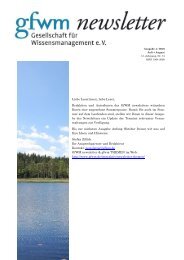Kuratiertes Dossier Wissensmanagement quo vadis?
Einstieg und Impuls zur zentralen Fragestellung beim GfWM KnowledgeCamp 2020
Einstieg und Impuls zur zentralen Fragestellung beim GfWM KnowledgeCamp 2020
Sie wollen auch ein ePaper? Erhöhen Sie die Reichweite Ihrer Titel.
YUMPU macht aus Druck-PDFs automatisch weboptimierte ePaper, die Google liebt.
Learning to Do
„Doing“ obviously should be a consequence of
what we know. Three decades of LearnTec and
other innovative platforms advocating educational
technologies did not stop Germany falling
behind in its urgent needed digitisation f.e. in
schools. The dimension of incompetence and
lack of infrastructure (just 24 % schools have
WLAN compared to 100 % in Denmark) is unspeakable
and matter of amusement in TV Comedy.
For decades no outcry occurred - other than
frowning. Of course politicians were praising numerous
impressive lighthouse projects - Germany,
Land of Ideas. Did we contribute to better scale
them to enlighten the wider society?
Learning to Live Together
The European Leonardo Award proposed
UNESCO´s approach, which drew on the expertise
of excellent practitioners and academics and
the advice of such diverse personalities like Gro
Harlem Brundtland, former PM of Norway and
Chairwomen of the World Commission of Climate
and Development, Daniel Goudevert, former
Chairman of VW Management Body and the legend
violinist Yehudi Menuhin. Imagine a similar
constellation on the issue of knowing and learning
today. Unthinkable. But why? In its „Agora“
format Leonardo got together decision makers,
experts, politician, NGO´s, innovators following
the path shown by UNESCO. Important insights
were exchanged and impulses given. All were exited
- but we suffered the same fate like „land of
ideas“ - did we not form a united voice to transform
ideas to political demands and anchor them
in the daily social and political life?
Learning to Be
is key for every individual and any community
alike. How do we act and react when essentials
of our pure existence are at stake? Is learning and
knowing separable of ethics and acting? Interestingly
those being accused of being unprofessional
and an annoyance like „Fridays for Future“ or
Extinction Rebellion are themselves not pointing
to some occult insights but to well known results
of science paid for by the public. „Science for Future“
was evoked by „Fridays for Future“ cause
they rightly were perceived as a form of „researching
application“. A great provocation in times,
when „professionalism“ demands obedience and
opportunism to ruling norms regardless of whether
this conformity is conform with the issues at
stake. Whilst in current school systems we too
often are trained to subordinate the content of
school subjects to the selecting criteria of how
fast we can reproduce facts and figures compared
to others, young people make the experience
that going to the bottom of what matters requires
knowledge not restricted by an agenda triggered
by the clock switching in 45 min from subject to
subject: SKOLSTREJK. Could the community of
learning and knowledge professionals add more
strongly their strength to bridge this gap between
the societal spheres?
Tripple A for Subprime Knowledge
In a session concept for KnowTech 2008 at the
start of the financial crisis („Wissen - Macht - Finanzen:
Dialog für die Wissensgesellschaft“) we
tried to explain that the economic meltdown was
revealing a poor understanding of its systemic
origins lacking an holistic analysis of interdependencies.
The true scandal besides the subprime
loans were the fuelling of those risky papers into
the global circulation honouring them with best
gradings by top knowledge based consulting
companies and their highly knowledgeable experts.
That’s why we coined (!) their approach
„subprime knowledge“. What is mistakenly regarded
as simple speculation by bad boys/girls is
on the contrary a highly sophisticated modelling
activity of an industry. Other than most experts
in understaffed governmental institutions they are
aware of the interdependencies in regulations and
the global loopholes and make them their business
case - whatever the cost for society. That’s
why „after“ the financial crisis is „before“ next
systemic scandals like WireCard and CumEx, the
6






